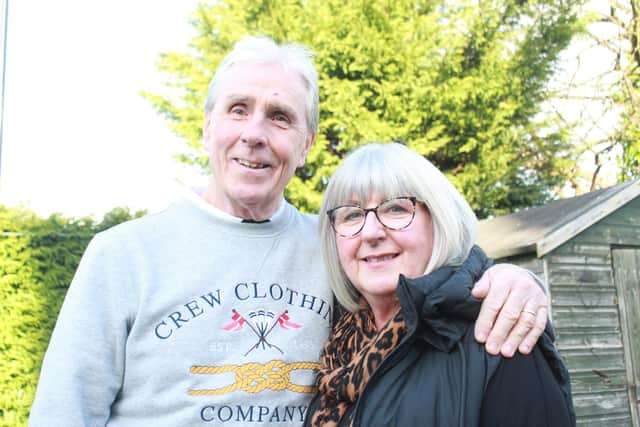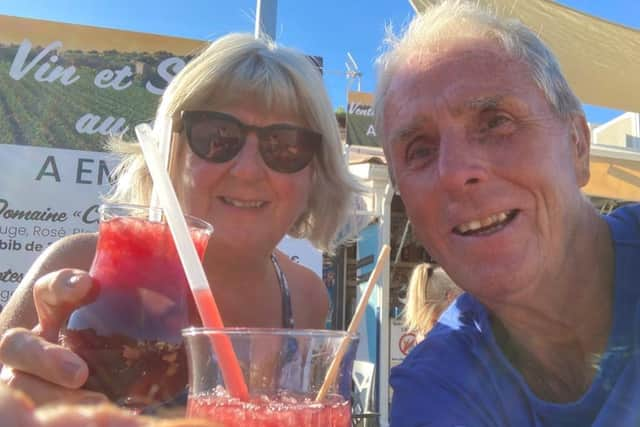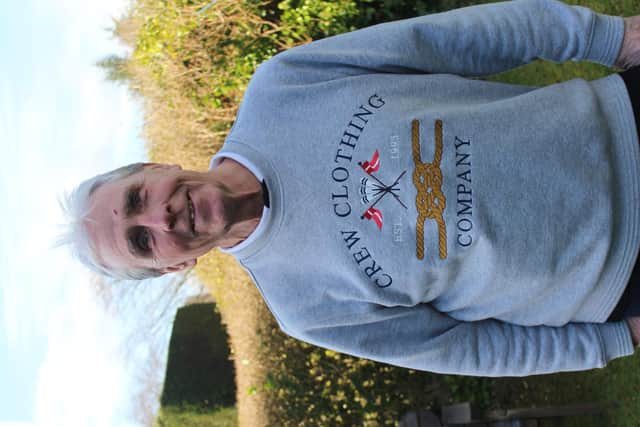Bladder cancer Sheffield: How Kevin Philliskirk battled illness and embraced life with urostomy bag
and live on Freeview channel 276
But for Sheffield cancer survivor Kevin Philliskirk, it’s the urostomy bag he had fitted to catch his urine after he had life saving cancer survery, affectionately called Paloma the Stoma.
The former policeman, from Ecclesall, said: “Thanks to immunotherapy, I am still here – and thanks to Paloma, I can now stand at the bar having a drink - and go for a wee at the same time!”
Advertisement
Hide AdAdvertisement
Hide AdKevin had surgery, chemotherapy and then targeted immunotherapy treatment - and with a little help from his new pal ‘Paloma the Stoma’ - he’s back to being fit and well and enjoying life to the full.


After confronting bladder cancer, the 66-year-old had a permanent urinary stoma (urostomy) – a surgical procedure that created an opening in the skin of his abdomen, which is attached to his urinary tract. His wee is now collected in a special stoma bag worn on the outside of tummy and giving his new appendage a nickname helped him to adjust. “I just needed to make friends with my stoma and carry-on enjoying life,” he explained.
Now Kevin is planning to take part in Race for Life this year, now hopes that sharing his story will inspire others to play a part in the fight against the disease.
With around 33,300 people diagnosed with cancer every year in Yorkshire and The Humber, Kevin’s message is clear – to save lives tomorrow, Cancer Research UK needs the public’s support today.
Advertisement
Hide AdAdvertisement
Hide AdHe is calling on people across Sheffield to give regularly to the charity to help fund long term research projects that could drive new breakthroughs for people like him. Life-saving cancer treatments like immunotherapy are made possible by months and months of trialling, testing and learning. But monthly progress in research needs monthly donations.


Kevin, who went on to have a successful career as a coach educator in professional football, including at Barnsley FC, Sheffield United and the Football Association, was diagnosed with bladder cancer in September 2018, after noticing redness in his urine while on a summer holiday in France with wife Glynis, 63.
After visiting his GP and being referred to hospital for tests which confirmed the cancer, Kevin started a course of chemo at Western Park Hospital to try and reduce the size of his tumour. But unfortunately, it didn’t work for him.
So, in February 2019 he had all his bladder removed by robotic surgery, as part of a clinical trial.
Advertisement
Hide AdAdvertisement
Hide AdWithout a bladder Kevin would no longer be able to go to the toilet in the usual way. Hence, the stoma was fitted


Kevin, who recently raised £150 for Cancer Research UK through a push-up challenge, used his positive mindset to take on this major change to his life and adapted to living with ‘Paloma’, determined not to let it stop him. He was supported by his wife, two children and two grandchildren – as well as his many friends.
But then Kevin faced another blow. Although his bladder surgery was successful, a follow-up scan showed that some of the cancer cells had spread to his lungs.
Fortunately, he was able to start a two-year course of a new kind of cancer treatment – immunotherapy – which uses the immune system to fight cancer. It works by helping the patient’s immune system recognise and attack cancer cells, leaving healthy cells alone.The immunotherapy treatment has been a success. He went from having scans every three weeks, to every three months, and they’ve shown that there is no change, and his cancer is controlled.
Advertisement
Hide AdAdvertisement
Hide AdKevin said: “Research into better treatments has given me the greatest gift - more precious time with my loved ones. But this wouldn’t be possible without the dedication of scientists who are relentlessly striving towards new milestones month after month. They need our support.


“I chose to approach the removal of my bladder in a positive way. I threw vanity out of the window because I knew this was going to help give me a better chance. I wanted to get rid of the problem – and the problem was my bladder. I just needed to make friends with my stoma and carry-on enjoying life, that’s why I gave it a nickname – Paloma – which helps my family and friends deal with it too! And to Paloma, I can now stand at the bar having a drink - and go for a wee at the same time!
“But when they found my cancer had spread, doctors were able to give me new hope thanks to immunotherapy – a treatment that was not even around a few years ago – so I know research really has saved my life.”
“Success stories like mine would not be possible without the work of Cancer Research UK, who have played a major part in the development of immunotherapy treatment, and the fantastic doctors and surgeons at Weston Park. And it was important to me to have played my part by taking part in clinical trials to help other cancer patients in the future.
“By donating monthly to Cancer Research UK, people across Sheffield could help give hope to many more families like mine and save lives for generations to come.”
Cancer Research UK has been at the heart of progress that has seen survival in the UK double in the last 40 years.
Advertisement
Hide AdAdvertisement
Hide AdIts research has led to more than 50 cancer drugs used across the UK - and around the world - from widely used chemotherapies to new-generation precision treatments.
In fact, drugs linked to the charity are used to treat more than 125,000 patients in the UK every year.
Cancer Research UK spokesperson for Yorkshire, Nicki Embleton, said:
“One in two of us will get cancer in our lifetime, but all of us can help beat it. Thanks to supporters like Kevin, we’ve been at the forefront of cancer research for over 120 years and we’re not stopping now.
Advertisement
Hide AdAdvertisement
Hide Ad“Regular giving is crucial to our work because it means we can fund long term research – research that could lead to new discoveries about cancer and unlock new ways to prevent, diagnose and treat it. So, we hope more people across Sheffield will donate monthly - if they can.
“We’re working towards a world where we can all live longer, better lives, free from the fear of cancer. Beating the disease is a long game, but it’s one that – together - we will win.”
Cancer Research UK was able to spend over £6 million in Yorkshire last year on some of the UK’s leading scientific and clinical research.
Donate monthly to life-saving cancer research at cruk.org/donate
